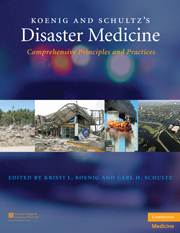Preface
Published online by Cambridge University Press: 05 August 2011
Summary
The specialty of disaster medicine has grown substantially since the terrorist attacks of 9/11 in the United States. In support of this growth, a number of disaster-related textbooks have been published. In some cases, however, these treatises have been authored by the 9/12'ers – people who suddenly gained interest and “expertise” in disasters once the topic became popular and U.S. federal funding flowed freely. As a result, much of the subject matter in these works was covered ineffectively. The challenge remained to create the definitive book written by nationally and internationally respected authors. We have considered editing such a book for the last dozen years; however, the timing never seemed right, and there was that ever-present thought that it would not be possible to “do it right” because we did not know exactly what “it” was.
Complicating the situation is the absence of a standard definition of disaster, much less a uniform concept for an academic discipline of disaster medicine. The need to codify this emerging discipline and create such standards is becoming increasingly clear. For example, the president of the United States issued a Homeland Security Presidential Directive (HSPD) on October 18, 2007 entitled “Public Health and Medical Preparedness.” HSPD-21 “establishes a National Strategy for Public Health and Medical Preparedness, which builds upon principles set forth in Biodefense for the 21st Century (April 2004).”
- Type
- Chapter
- Information
- Koenig and Schultz's Disaster MedicineComprehensive Principles and Practices, pp. xxiii - xxviPublisher: Cambridge University PressPrint publication year: 2009

